Web design in Dubai combines creativity, cultural awareness, and technical precision to meet the needs of a diverse, tech-savvy audience. With over 96% internet penetration and mobile usage dominating, businesses must prioritize user-friendly, bilingual websites that cater to both Arabic and English speakers. Compliance with UAE regulations, mobile optimization, and fast loading speeds are non-negotiable for success.
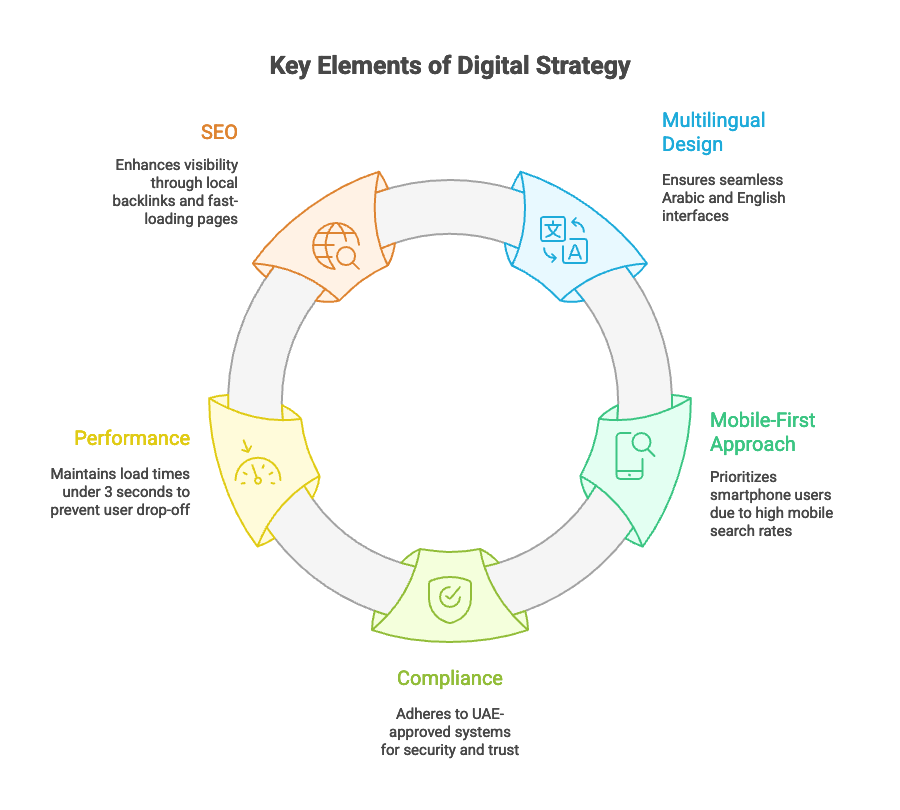
Dubai's competitive market demands websites that are not only visually appealing but also technically robust and culturally aligned. This guide explores how to achieve this balance while meeting user expectations and business goals.
Seamless Arabic (RTL) and English interfaces are essential.
Over 80% of searches happen on smartphones.
Adhere to UAE-approved systems (e.g., payment gateways, SSL encryption).
Load times under 3 seconds prevent user drop-off.
Local backlinks, multilingual structure, and fast-loading pages boost visibility.
Dubai’s rapid digital growth is fueling the need for web solutions tailored to a tech-savvy audience. With internet users in the UAE reached 9.5 million by 2024 [3], businesses must address specific design needs to stay competitive in this evolving market.
In Dubai, bilingual websites are a must, as both Arabic and English are widely used. Creating a seamless experience for users in both languages involves:
Right-to-left (RTL) layouts for Arabic
Optimized fonts to support both scripts
Culturally appropriate visuals and colors
Smooth navigation between language versions
This dual-language support is essential for delivering a user-friendly experience [2]. Beyond language, technical integration with local systems is equally critical.
Websites in Dubai need to align with the region's digital infrastructure and adhere to strict regulations. Here’s what that entails:
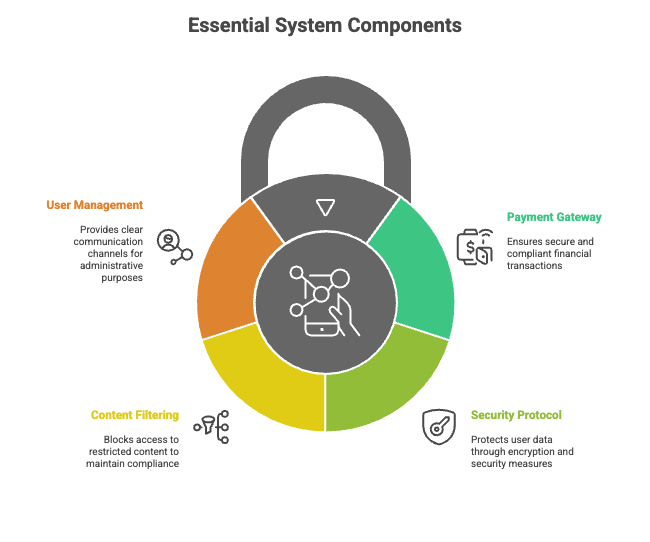
These measures, mandated by the TDRA, not only ensure compliance but also build user trust. For instance, the TDRA requires “efficient mechanisms for users to reach administration and clear privacy policies” [5].
Dubai’s web design principles emphasize both aesthetic appeal and regulatory adherence.
Visual Elements:
Clean, interactive layouts optimized for mobile devices [1][4]
Advanced features like 3D effects and animations [4]
Regulatory Compliance:
Websites must align with UAE cultural values, adhere to media regulations, and prioritize user privacy [6].
“Websites that are providing their service and targeting users in UAE are advised to respect the public morality in the country… to avoid denial of access to their content and services.” – TDRA [5]”
With the e-commerce sector hit $22 billion by 2024 [1], businesses are leveraging AI-driven personalization and user experience enhancements to capture this growing market [4].
These elements are essential for creating effective websites in Dubai’s competitive digital space. With an internet penetration rate of 99% [7], standing out requires meeting the region’s high design expectations.
Mobile optimization is a must in Dubai, where over 80% of searches happen on smartphones [9]. Here are some key mobile design features to focus on:
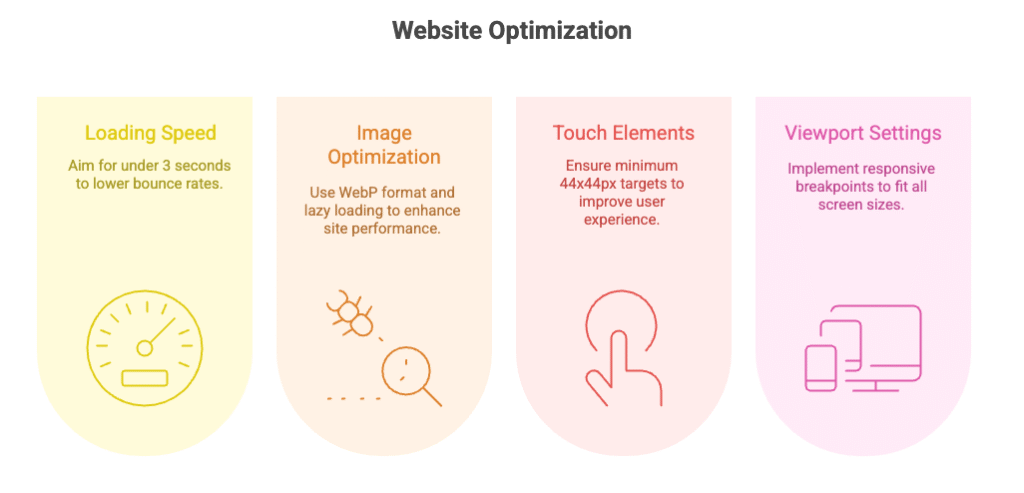
After optimizing for mobile, SEO is the next priority for visibility. With Google holding a 95% market share in the UAE [7], a solid SEO strategy in both English and Arabic is essential.
Here are the top technical SEO priorities:
1. Multilingual Structure
Use hreflang tags and proper URL structures to cater to Dubai’s multilingual audience, ensuring both English and Arabic users can navigate easily.
2. Local Signals
Strengthen your online presence with local backlinks and consistent NAP (Name, Address, Phone) details across platforms [9].
3. Technical Performance
Improve loading times by enabling browser caching, compressing images, and using CDNs (Content Delivery Networks) [9].
Supporting both English and Arabic requires careful adjustments to the website’s interface:
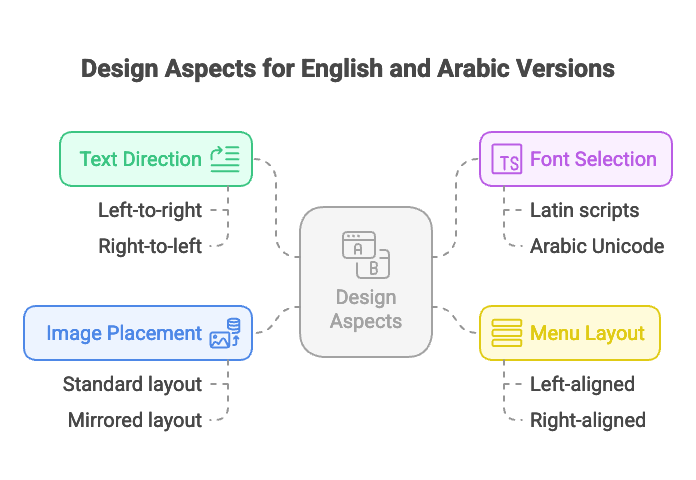
Using Modern Standard Arabic (MSA) broadens your reach across the Arab world [8]. Your interface should adapt seamlessly based on the selected language while maintaining a consistent and polished look.
These customizations align with Dubai’s cultural preferences, especially during key occasions like UAE National Day, Ramadan, and White Friday [7]. Incorporating seasonal content into a flexible design ensures better engagement while keeping the core navigation intact. This approach reflects Dubai’s dynamic digital environment.
Creating successful websites for Dubai’s market requires careful preparation and execution. Below is a breakdown of the key steps to meet local business needs.
A solid plan and strategy are the foundation of a successful website. Here’s a quick look at the main phases:
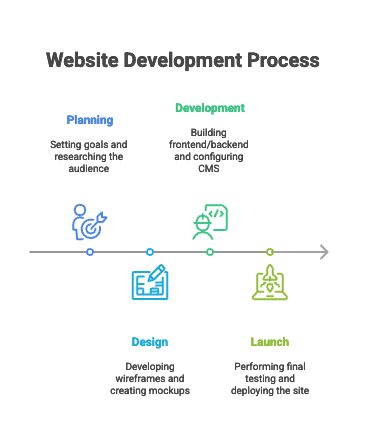
Make sure to define your business goals clearly and include essential pages like About Us, Privacy Policy, and Contact Information.
Once the framework is ready, the next step is finding the right design partner.
Look for a portfolio showcasing modern, mobile-friendly, and multilingual designs. Confirm the designer’s skills in areas like SEO, CMS integration, and performance optimization.
It’s not just about aesthetics – your website should align seamlessly with your business operations.
For Dubai businesses, websites that connect directly to core operations can make a real difference. Key integrations to consider include:
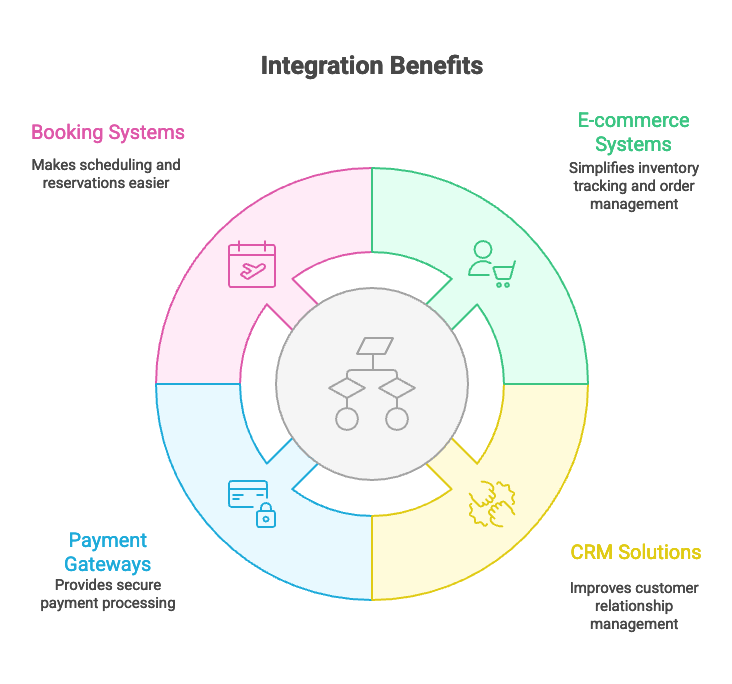
Custom tools should work smoothly with your existing systems and databases [10]. Automate tasks like support ticket management, inventory updates, order handling, email campaigns, and social media activities. These integrations can cut costs and improve operational efficiency for Dubai businesses [11].
Today’s websites in Dubai need to be quick and efficient. Techniques like lazy loading for images, compressing CSS and JavaScript files, and leveraging CDNs help ensure pages load swiftly. These methods lay the groundwork for incorporating advanced design features without sacrificing speed.
Adding 3D and animation elements can boost user engagement and increase conversions. These features bring a dynamic touch to websites, making them more memorable. Here’s a breakdown of costs for different animation types:
Voice navigation is becoming a key feature for accessibility, especially in Dubai’s multicultural environment. By offering multilingual support, it improves user experience for a diverse audience. A good example is Yango Maps, which provides voice prompts in both English and Arabic, catering to local language needs.
“Accessibility is an excellent benefit for VUI devices. For someone with limited mobility or physical limitations, the voice user interface simplifies the overall experience.” – Ramotion Agency
To meet the needs of Dubai’s population, voice interfaces must handle a wide range of accents accurately. This ensures that as technology evolves, websites remain accessible and meet high professional standards.
Web design in Dubai demands precision in performance and user experience. Consider this: mobile users tend to leave websites that take more than three seconds to load [13], and 42% will abandon a site due to poor functionality [14]. These numbers highlight the importance of creating fast, user-friendly websites.
Here are some key areas to focus on:
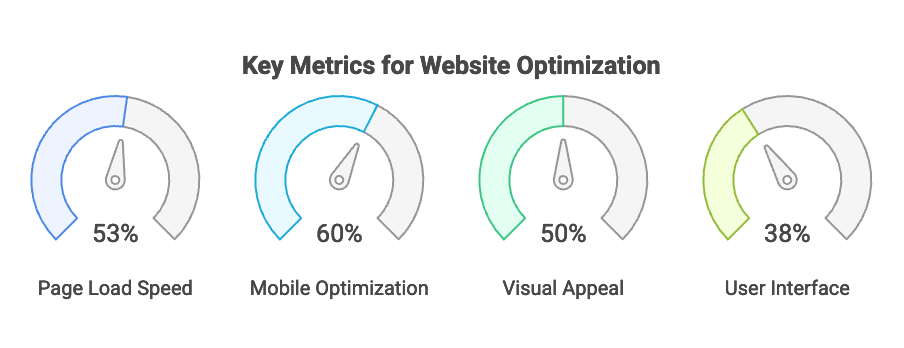
These metrics directly influence success, as evidenced by global and local examples. For instance, mobile commerce plays a major role in Dubai’s digital market. A local retailer saw a 30% boost in user retention after improving their mobile site [14], showing how well-planned web design can deliver measurable results.
“By utilizing ambiguous navigation labels, we’ve demonstrated that you are allowing room for failure and overlooking a chance to establish clarity regarding your identity and offering.” – Hilary Basch, Senior User Experience Designer [15]
With Dubai’s e-commerce market valued at $27 billion in 2022 [13], staying competitive means constantly refining your website. Regularly monitor these performance areas and partner with web design experts who understand Dubai’s unique digital environment. This approach ensures you meet user expectations and achieve your business goals.
To create a successful bilingual website for Dubai's diverse audience, it's important to focus on both functionality and cultural relevance. First, ensure the site supports Arabic (RTL) and English (LTR) layouts seamlessly, providing a user-friendly experience for both language groups. Pay attention to culturally appropriate visuals, colors, and content that resonate with the local Emirati population as well as the international expatriate community.
Additionally, optimize the website for SEO in both languages to improve visibility in search engines and attract a wider audience. Lastly, prioritize clear language-switching options, ensuring users can easily toggle between Arabic and English without confusion. A thoughtful approach to these elements will help your website effectively engage Dubai's multilingual and multicultural audience.
To comply with local laws and build user trust, businesses in Dubai should prioritize adherence to the UAE’s Personal Data Protection Law, which governs how personal data is processed and mandates user consent in most cases. This ensures transparency and safeguards sensitive information.
Additionally, businesses should implement secure data practices like SSL encryption, publish a clear and accessible privacy policy, and ensure their content aligns with local internet guidelines to maintain public morality. Using HTTPS and creating a user-friendly, mobile-responsive website with authentic customer reviews can further enhance trust and credibility for users in Dubai’s competitive digital market.
To enhance a website's performance and SEO in Dubai's competitive market, focus on SEO-driven web design that prioritizes search engine rankings while delivering an excellent user experience. Implement technical SEO practices, such as optimizing page speed, mobile responsiveness, and site structure, to ensure your website performs efficiently.
Additionally, invest in on-page SEO by using relevant keywords, creating high-quality content, and optimizing meta tags. Regularly publishing fresh, engaging content tailored to Dubai's audience can also help improve visibility. Combining these strategies with consistent performance monitoring will position your website for success in Dubai's dynamic digital landscape.